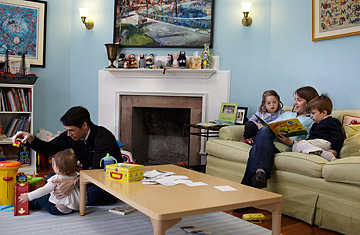
The new face of the Down-syndrome family. Becker reads to her daughter Penny, who has Down syndrome, and her son. Becker's book is about raising a child with the condition.
(2 of 5)
But the advances haven't come cheap. If prenatal screening continues to reduce the size of the Down population, will policymakers decide they simply can't afford expensive programs that fewer and fewer people will ever need? "It's a scalable issue," says Ruth Faden, director of the Berman Institute of Bioethics at Johns Hopkins University. "But it's ethically wrong to fail to attend to the needs of these children." As with so many other situations in which morals, medicine and emotion collide, there are no easy--or painless--answers.
Go or No-Go
For Mclaughlin, the decision to continue or terminate her pregnancy had a special urgency. Her 20-week test came just a month before the 24-week threshold after which, under Massachusetts law, abortion was permissible only to save a mother's life. So she and her husband took advantage of a local support program and met with two families, each with a 5-year-old with Down syndrome. "I wanted to know what I was up against," she says.
What they discovered left them with much to mull over. One child, Anna, chattered away and played hide-and-seek with McLaughlin's kids. Anna was delayed developmentally compared with Aiden, their own 5-year-old--she was smaller, and her vocabulary wasn't as extensive as that of a typical child her age--but she was personable and outgoing. The second child, Amanda, was more delayed: she couldn't speak. Yet both sets of parents told McLaughlin that they loved their kids just as they were; even if they could pluck the extra 21st chromosome that causes the syndrome from each and every cell, they wouldn't. "I figured they were saying that only because now that their children were here," she says, "they didn't have a choice."
McLaughlin and her husband decided to go ahead all the same. Meeting Anna had convinced them that they might well have a baby who was just as smart and engaging. "I wanted this baby," she says. "I didn't think I could terminate."
That baby, a girl named Gracie, was born on Dec. 26, 2007, and McLaughlin needed eight hours after her C-section to muster the nerve to visit her in the neonatal intensive-care unit. "I was so afraid of what she was going to look like. Finally, I went down in the middle of the night. She looked huge and healthy, and she was beautiful, just like my other babies."
Now 4, Gracie is thriving. She didn't learn to walk until she was 3, and her speech is slow in coming. But McLaughlin and her husband began teaching her sign language when she was 6 months old, both to stimulate her mind and to give her another way to communicate. By age 2, Gracie had accumulated 100 signs, prompting her grandmother to ask, "Are you sure she has Down syndrome?" She does, of course, but to her parents that's fine. "She's not going to do quantum physics, but I don't do quantum physics," says McLaughlin. "Gracie has shown me that I am not in control of everything. I have a bumper sticker that says GRACE HAPPENS."
